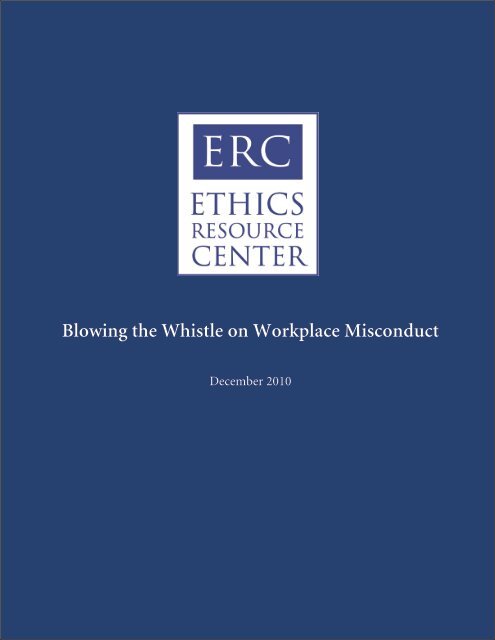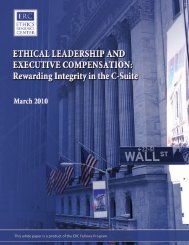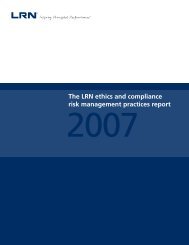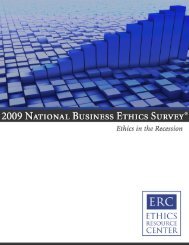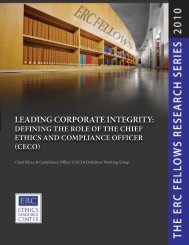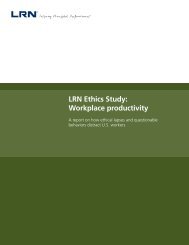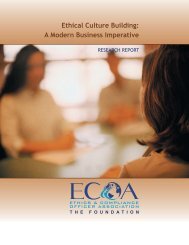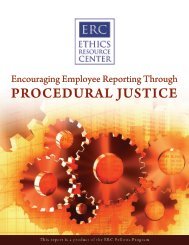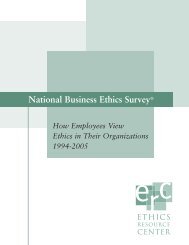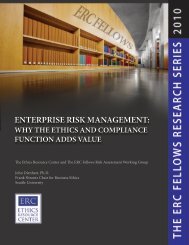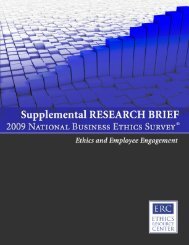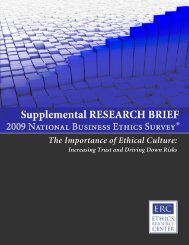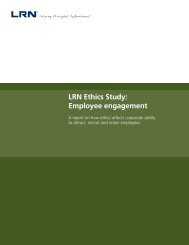Blowing the Whistle on Workplace Misconduct - Ethics Resource ...
Blowing the Whistle on Workplace Misconduct - Ethics Resource ...
Blowing the Whistle on Workplace Misconduct - Ethics Resource ...
You also want an ePaper? Increase the reach of your titles
YUMPU automatically turns print PDFs into web optimized ePapers that Google loves.
<str<strong>on</strong>g>Blowing</str<strong>on</strong>g> <str<strong>on</strong>g>the</str<strong>on</strong>g> <str<strong>on</strong>g>Whistle</str<strong>on</strong>g> <strong>on</strong> <strong>Workplace</strong> Misc<strong>on</strong>duct<br />
December 2010
Founded in 1922, <str<strong>on</strong>g>the</str<strong>on</strong>g> <strong>Ethics</strong> <strong>Resource</strong> Center (ERC) is America’s oldest n<strong>on</strong>profit organizati<strong>on</strong> devoted to<br />
<str<strong>on</strong>g>the</str<strong>on</strong>g> advancement of high ethical standards and practices in public and private instituti<strong>on</strong>s. For 88 years, ERC<br />
has been a resource for organizati<strong>on</strong>s committed to a str<strong>on</strong>g ethical culture. ERC’s expertise also informs<br />
<str<strong>on</strong>g>the</str<strong>on</strong>g> public dialogue <strong>on</strong> ethics and ethical behavior. ERC researchers analyze current and emerging issues<br />
and produce new ideas and benchmarks that matter — for <str<strong>on</strong>g>the</str<strong>on</strong>g> public trust.<br />
To learn more about ERC, visit www.ethics.org
<str<strong>on</strong>g>Blowing</str<strong>on</strong>g> <str<strong>on</strong>g>the</str<strong>on</strong>g> <str<strong>on</strong>g>Whistle</str<strong>on</strong>g> <strong>on</strong> <strong>Workplace</strong> Misc<strong>on</strong>duct<br />
Like it or not, from time to time, people do <str<strong>on</strong>g>the</str<strong>on</strong>g> wr<strong>on</strong>g thing. Some mistakes are unintenti<strong>on</strong>al;<br />
simple human errors that happen despite our best efforts to do <str<strong>on</strong>g>the</str<strong>on</strong>g> right thing. O<str<strong>on</strong>g>the</str<strong>on</strong>g>r<br />
times, misc<strong>on</strong>duct is deliberate; whe<str<strong>on</strong>g>the</str<strong>on</strong>g>r out of anger, frustrati<strong>on</strong>, or a desire to fur<str<strong>on</strong>g>the</str<strong>on</strong>g>r <str<strong>on</strong>g>the</str<strong>on</strong>g>ir<br />
own self-interest, individuals will break <str<strong>on</strong>g>the</str<strong>on</strong>g> rules for any number of reas<strong>on</strong>s. Depending <strong>on</strong><br />
which rules are broken and who violates <str<strong>on</strong>g>the</str<strong>on</strong>g>m, misc<strong>on</strong>duct can hurt o<str<strong>on</strong>g>the</str<strong>on</strong>g>rs – especially when<br />
it happens in a large business or o<str<strong>on</strong>g>the</str<strong>on</strong>g>r organizati<strong>on</strong> in which many people have a stake.<br />
Given <str<strong>on</strong>g>the</str<strong>on</strong>g> potential of law breaking and o<str<strong>on</strong>g>the</str<strong>on</strong>g>r misc<strong>on</strong>duct to destroy companies and <str<strong>on</strong>g>the</str<strong>on</strong>g><br />
people who work for <str<strong>on</strong>g>the</str<strong>on</strong>g>m, <str<strong>on</strong>g>the</str<strong>on</strong>g> development of ethical cultures that encourage people to<br />
act with integrity should be a high priority for both public and private instituti<strong>on</strong>s. With<br />
that in mind, <str<strong>on</strong>g>the</str<strong>on</strong>g> <strong>Ethics</strong> <strong>Resource</strong> Center is c<strong>on</strong>tinuously working to understand workplace<br />
behavior, to identify how employees feel about <str<strong>on</strong>g>the</str<strong>on</strong>g> places <str<strong>on</strong>g>the</str<strong>on</strong>g>y work, what factors affect <str<strong>on</strong>g>the</str<strong>on</strong>g>ir<br />
c<strong>on</strong>duct, how <str<strong>on</strong>g>the</str<strong>on</strong>g>y react when <str<strong>on</strong>g>the</str<strong>on</strong>g>y see o<str<strong>on</strong>g>the</str<strong>on</strong>g>rs break <str<strong>on</strong>g>the</str<strong>on</strong>g> rules, and what motivates <str<strong>on</strong>g>the</str<strong>on</strong>g>m to<br />
take acti<strong>on</strong>. Our research is a c<strong>on</strong>stant work in progress; every day we learn more. The<br />
informati<strong>on</strong> we ga<str<strong>on</strong>g>the</str<strong>on</strong>g>r evolves c<strong>on</strong>tinuously as circumstances change, envir<strong>on</strong>ments transform,<br />
and employees revisit <str<strong>on</strong>g>the</str<strong>on</strong>g>ir attitudes and behavior.<br />
Still, <str<strong>on</strong>g>the</str<strong>on</strong>g>re is much that we know. For example, employees are more likely to blow <str<strong>on</strong>g>the</str<strong>on</strong>g><br />
whistle <strong>on</strong> bad behavior when <str<strong>on</strong>g>the</str<strong>on</strong>g>y feel good about <str<strong>on</strong>g>the</str<strong>on</strong>g>ir company and believe management<br />
has a str<strong>on</strong>g commitment to ethical c<strong>on</strong>duct. We also know that attitudes change depending<br />
<strong>on</strong> how management behaves, and also in resp<strong>on</strong>se to external factors. Data collected by<br />
<str<strong>on</strong>g>the</str<strong>on</strong>g> ERC over <str<strong>on</strong>g>the</str<strong>on</strong>g> years show that c<strong>on</strong>duct improves, at least for a time, after periods of public<br />
scandal and o<str<strong>on</strong>g>the</str<strong>on</strong>g>r difficulties — and seems to fall during boom times. Our most recent<br />
Nati<strong>on</strong>al Business <strong>Ethics</strong> Survey, for example, shows that resp<strong>on</strong>se to misc<strong>on</strong>duct was at its<br />
weakest in 2005 when <str<strong>on</strong>g>the</str<strong>on</strong>g> ec<strong>on</strong>omy was str<strong>on</strong>g, but streng<str<strong>on</strong>g>the</str<strong>on</strong>g>ned after <str<strong>on</strong>g>the</str<strong>on</strong>g> recent recessi<strong>on</strong>.<br />
Employees surveyed in 2009 report that <str<strong>on</strong>g>the</str<strong>on</strong>g> amount of misc<strong>on</strong>duct is down and company<br />
cultures are str<strong>on</strong>ger.<br />
As part of our commitment to advance public dialogue and assist <str<strong>on</strong>g>the</str<strong>on</strong>g> enforcement community,<br />
including company management and boards, government enforcement agencies, and<br />
ethics & compliance (E&C) officers, <str<strong>on</strong>g>the</str<strong>on</strong>g> following pages share some of what we’ve learned.<br />
___________________________________<br />
1. “<strong>Ethics</strong> in <str<strong>on</strong>g>the</str<strong>on</strong>g> Recessi<strong>on</strong>,” 2009 Nati<strong>on</strong>al Business <strong>Ethics</strong> Survey, p. 9,The <strong>Ethics</strong> <strong>Resource</strong> Center,<br />
http://ethics.org/nbes<br />
Page 1<br />
©2010 <strong>Ethics</strong> <strong>Resource</strong> Center
The <str<strong>on</strong>g>Whistle</str<strong>on</strong>g>blower: A Prime Source<br />
Corporate executives know that <strong>on</strong>e of <str<strong>on</strong>g>the</str<strong>on</strong>g> best ways to pinpoint problems in <str<strong>on</strong>g>the</str<strong>on</strong>g>ir organizati<strong>on</strong><br />
is to listen to whistleblowers. Experience shows <str<strong>on</strong>g>the</str<strong>on</strong>g>re are more whistleblowers than<br />
many might expect. In 2009, more than six out of ten employees said <str<strong>on</strong>g>the</str<strong>on</strong>g>y reported workplace<br />
misc<strong>on</strong>duct when <str<strong>on</strong>g>the</str<strong>on</strong>g>y saw it.<br />
Employees, <str<strong>on</strong>g>the</str<strong>on</strong>g> people who know best <str<strong>on</strong>g>the</str<strong>on</strong>g> work envir<strong>on</strong>ment, <str<strong>on</strong>g>the</str<strong>on</strong>g> attitudes of <str<strong>on</strong>g>the</str<strong>on</strong>g>ir peers,<br />
whe<str<strong>on</strong>g>the</str<strong>on</strong>g>r management means what it says about ethics, and whe<str<strong>on</strong>g>the</str<strong>on</strong>g>r people are breaking <str<strong>on</strong>g>the</str<strong>on</strong>g><br />
rules, tell <str<strong>on</strong>g>the</str<strong>on</strong>g> ERC <str<strong>on</strong>g>the</str<strong>on</strong>g>y will blow <str<strong>on</strong>g>the</str<strong>on</strong>g> whistle <strong>on</strong> bosses as well as co-workers. More than<br />
three-quarters surveyed by <str<strong>on</strong>g>the</str<strong>on</strong>g> ERC say <str<strong>on</strong>g>the</str<strong>on</strong>g>y would not “look <str<strong>on</strong>g>the</str<strong>on</strong>g> o<str<strong>on</strong>g>the</str<strong>on</strong>g>r way” if <str<strong>on</strong>g>the</str<strong>on</strong>g>ir employer<br />
did something questi<strong>on</strong>able.<br />
ERC’s annual Nati<strong>on</strong>al Business <strong>Ethics</strong> Survey (NBES), widely c<strong>on</strong>sidered <str<strong>on</strong>g>the</str<strong>on</strong>g> U.S. benchmark<br />
<strong>on</strong> ethics, found that <str<strong>on</strong>g>the</str<strong>on</strong>g> share of workers who report negative behavior rose to 63<br />
percent in 2009, a solid gain from 58 percent in 2007. Between 2000 and 2009 about 59<br />
percent of employees <strong>on</strong> average said that <str<strong>on</strong>g>the</str<strong>on</strong>g>y observed and reported misc<strong>on</strong>duct, usually<br />
to an internal company authority. To an optimist, that data say <str<strong>on</strong>g>the</str<strong>on</strong>g> ethics glass is about<br />
6/10ths full. That’s encouraging because a lot of misc<strong>on</strong>duct is being challenged. But it also<br />
means that <str<strong>on</strong>g>the</str<strong>on</strong>g>re is still much work to do because over <str<strong>on</strong>g>the</str<strong>on</strong>g> decade, four in ten employees<br />
who witnessed workplace misc<strong>on</strong>duct did not typically report it. 2<br />
Percentage Who Reported Misc<strong>on</strong>duct They Observed: 2000 - 2009<br />
100%<br />
Percentage Who Reported Misc<strong>on</strong>duct<br />
They Observed<br />
80%<br />
60%<br />
40%<br />
20%<br />
56%<br />
64%<br />
53%<br />
58%<br />
63%<br />
©2010 <strong>Ethics</strong> <strong>Resource</strong> Center<br />
0<br />
2000 2003 2005 2007 2009<br />
___________________________________<br />
2. “Reporting: Who’s Telling You What You Need to Know, Who Isn’t, and What You Can Do About It,<br />
Supplemental Research Brief, 2009 Nati<strong>on</strong>al Business <strong>Ethics</strong> Survey, pp. 1-2, The <strong>Ethics</strong> <strong>Resource</strong> Center,<br />
http://ethics.org/nbes<br />
Page 2<br />
©2010 <strong>Ethics</strong> <strong>Resource</strong> Center
Thus, <strong>on</strong>e of <str<strong>on</strong>g>the</str<strong>on</strong>g> critical challenges facing both E&C officers and government enforcement<br />
officials is c<strong>on</strong>vincing employees to step forward when misc<strong>on</strong>duct occurs. Successful E&C<br />
programs work toward that goal by building cultures in which reporting misc<strong>on</strong>duct seems<br />
like a normal part of <str<strong>on</strong>g>the</str<strong>on</strong>g> job. To that end, some companies have linked ethical c<strong>on</strong>duct to<br />
performance reviews to make clear that good behavior is a job expectati<strong>on</strong>. O<str<strong>on</strong>g>the</str<strong>on</strong>g>r companies,<br />
believing that some workers do not report violati<strong>on</strong>s because <str<strong>on</strong>g>the</str<strong>on</strong>g>y fear retaliati<strong>on</strong>,<br />
have set up hotlines that assure reporting can be d<strong>on</strong>e in private with less risk of being seen<br />
by a co-worker. Similarly, C<strong>on</strong>gress has included legal protecti<strong>on</strong>s for whistleblowers and<br />
even established m<strong>on</strong>etary rewards for tipsters to encourage insiders to come forward with<br />
informati<strong>on</strong> that could send wr<strong>on</strong>gdoers to jail.<br />
Page 3<br />
©2010 <strong>Ethics</strong> <strong>Resource</strong> Center
Who <str<strong>on</strong>g>the</str<strong>on</strong>g> <str<strong>on</strong>g>Whistle</str<strong>on</strong>g>blower Tells<br />
But, it turns out, that when employees report misc<strong>on</strong>duct, <str<strong>on</strong>g>the</str<strong>on</strong>g> company hotline is <strong>on</strong>e of<br />
<str<strong>on</strong>g>the</str<strong>on</strong>g> last places <str<strong>on</strong>g>the</str<strong>on</strong>g>y go. Although hotlines provide c<strong>on</strong>fidentiality or even an<strong>on</strong>ymity for<br />
employees nervous about tattling <strong>on</strong> a co-worker, <strong>on</strong>ly three of 100 reports about internal<br />
misc<strong>on</strong>duct come to company hotlines, according to data collected by <str<strong>on</strong>g>the</str<strong>on</strong>g> ERC. Indeed,<br />
according to ERC’s 2009 NBES, 15 percent of employees who observed and reported misc<strong>on</strong>duct<br />
perceive retaliati<strong>on</strong> as a result – most comm<strong>on</strong>ly a cold shoulder or verbal abuse<br />
from colleagues or a supervisor. About six in ten report snubs by co-workers and a similar<br />
number believe <str<strong>on</strong>g>the</str<strong>on</strong>g>ir supervisor excluded <str<strong>on</strong>g>the</str<strong>on</strong>g>m from decisi<strong>on</strong>s or work activity as payback<br />
for reporting misc<strong>on</strong>duct. More than four in ten say <str<strong>on</strong>g>the</str<strong>on</strong>g>y almost lost <str<strong>on</strong>g>the</str<strong>on</strong>g>ir job or were denied<br />
a raise. 3 Specific Forms of Retaliati<strong>on</strong> Experienced as a Result<br />
of Reported Misc<strong>on</strong>duct (2009)<br />
60%<br />
62%<br />
55%<br />
48%<br />
42%<br />
43%<br />
27%<br />
20%<br />
18%<br />
4%<br />
O<str<strong>on</strong>g>the</str<strong>on</strong>g>r employees gave you a<br />
cold shoulder<br />
Your supervisor or management excluded<br />
you from decisi<strong>on</strong>s and work activity<br />
You were verbally abused by your<br />
supervisor or some<strong>on</strong>e else in management<br />
You almost lost your job<br />
You were verbally abused by o<str<strong>on</strong>g>the</str<strong>on</strong>g>r employees<br />
You were not given promoti<strong>on</strong>s or raises<br />
You were relocated or reassigned<br />
Any o<str<strong>on</strong>g>the</str<strong>on</strong>g>r form of retaliati<strong>on</strong><br />
You were demoted<br />
You experienced physical harm to your pers<strong>on</strong> or property<br />
©2010 <strong>Ethics</strong> <strong>Resource</strong> Center<br />
___________________________________<br />
3. Op. Cit. “<strong>Ethics</strong> in <str<strong>on</strong>g>the</str<strong>on</strong>g> Recessi<strong>on</strong>,” p. 36<br />
Page 4<br />
©2010 <strong>Ethics</strong> <strong>Resource</strong> Center
Despite <str<strong>on</strong>g>the</str<strong>on</strong>g> prospect of retaliati<strong>on</strong>, <str<strong>on</strong>g>the</str<strong>on</strong>g> data show most employees would ra<str<strong>on</strong>g>the</str<strong>on</strong>g>r report<br />
wr<strong>on</strong>gdoing directly to somebody <str<strong>on</strong>g>the</str<strong>on</strong>g>y know than to a hotline. Some employees may believe<br />
<str<strong>on</strong>g>the</str<strong>on</strong>g>ir tips are more likely to be investigated when shared face-to-face instead of with a<br />
voicemail or an unfamiliar voice <strong>on</strong> a ph<strong>on</strong>e call.<br />
For <str<strong>on</strong>g>the</str<strong>on</strong>g> largest number of employees (46 percent), <str<strong>on</strong>g>the</str<strong>on</strong>g> most likely place to report is an immediate<br />
supervisor. Higher management was <str<strong>on</strong>g>the</str<strong>on</strong>g> sec<strong>on</strong>d favorite reporting locati<strong>on</strong> (29<br />
percent) in 2009.<br />
Only three percent used company hotlines to report misc<strong>on</strong>duct. A<br />
slightly larger number, four percent, took <str<strong>on</strong>g>the</str<strong>on</strong>g>ir suspici<strong>on</strong>s outside <str<strong>on</strong>g>the</str<strong>on</strong>g> company as <str<strong>on</strong>g>the</str<strong>on</strong>g>ir<br />
initial acti<strong>on</strong>. 4<br />
In 2009, as in 2007, Vast Majority of Reports Made to Managers<br />
Most<br />
employees<br />
Higher Management<br />
29%<br />
Your Supervisor<br />
46%<br />
Hotline 3%<br />
O<str<strong>on</strong>g>the</str<strong>on</strong>g>r 4%<br />
Some<strong>on</strong>e Outside Company 4%<br />
©2010 <strong>Ethics</strong> <strong>Resource</strong> Center<br />
would<br />
ra<str<strong>on</strong>g>the</str<strong>on</strong>g>r report<br />
wr<strong>on</strong>gdoing<br />
directly to<br />
somebody <str<strong>on</strong>g>the</str<strong>on</strong>g>y<br />
know than to a<br />
O<str<strong>on</strong>g>the</str<strong>on</strong>g>r Resp<strong>on</strong>sible Pers<strong>on</strong> 15%<br />
hotline.<br />
___________________________________<br />
4. Op. Cit. “Reporting: Who’s Telling You What You Need to Know, Who Isn’t, and What You Can Do About<br />
It,” p. 15<br />
Page 5<br />
©2010 <strong>Ethics</strong> <strong>Resource</strong> Center
That’s not to say that hotlines lack value. While hotline reporting makes up a relatively<br />
small percentage of all employee tips about misc<strong>on</strong>duct, <str<strong>on</strong>g>the</str<strong>on</strong>g> absolute number of hotline<br />
reports can be large. One major U.S. company, for example, told ERC c<strong>on</strong>fidentially that<br />
it receives an average of 431 hotline tips every m<strong>on</strong>th and that, <strong>on</strong> investigati<strong>on</strong>, almost 20<br />
percent of <str<strong>on</strong>g>the</str<strong>on</strong>g>se lead to findings of misc<strong>on</strong>duct.<br />
One major<br />
U.S. company<br />
receives an<br />
average of<br />
431 hotline<br />
tips every<br />
m<strong>on</strong>th.<br />
Understanding <str<strong>on</strong>g>the</str<strong>on</strong>g> venues employees choose for reporting can help us understand what<br />
motivates workers to report misc<strong>on</strong>duct and how to encourage more. The data tell us that<br />
<str<strong>on</strong>g>the</str<strong>on</strong>g> decisi<strong>on</strong> to report to <strong>on</strong>e’s direct supervisor versus higher management is related to <str<strong>on</strong>g>the</str<strong>on</strong>g><br />
ethical culture and climate of <str<strong>on</strong>g>the</str<strong>on</strong>g> workplace. In str<strong>on</strong>g cultures – with a t<strong>on</strong>e at <str<strong>on</strong>g>the</str<strong>on</strong>g> top that<br />
makes clear that ethics matter, where supervisors aggressively reinforce <str<strong>on</strong>g>the</str<strong>on</strong>g> ethics message,<br />
and where employees and managers alike are truly held accountable to high standards —<br />
more employees report to <str<strong>on</strong>g>the</str<strong>on</strong>g>ir direct supervisor. C<strong>on</strong>versely, reporting to higher management<br />
increases in weaker cultures and am<strong>on</strong>g employees who feel pressure. When paired<br />
with o<str<strong>on</strong>g>the</str<strong>on</strong>g>r findings, it appears that employees in weak cultures tend to report to higher<br />
management ra<str<strong>on</strong>g>the</str<strong>on</strong>g>r than direct supervisors because <str<strong>on</strong>g>the</str<strong>on</strong>g>y aren’t c<strong>on</strong>fident that lower level<br />
managers are fully committed to str<strong>on</strong>g ethics. In some cases, <str<strong>on</strong>g>the</str<strong>on</strong>g>y may fear retaliati<strong>on</strong> for<br />
sharing <str<strong>on</strong>g>the</str<strong>on</strong>g>ir c<strong>on</strong>cerns. Or, <str<strong>on</strong>g>the</str<strong>on</strong>g>y may simply lack c<strong>on</strong>fidence that <str<strong>on</strong>g>the</str<strong>on</strong>g>ir direct supervisor will<br />
pursue <str<strong>on</strong>g>the</str<strong>on</strong>g> issue. In those instances, turning to senior management can provide <str<strong>on</strong>g>the</str<strong>on</strong>g> safety<br />
of <str<strong>on</strong>g>the</str<strong>on</strong>g> organizati<strong>on</strong>al structure and a belief that higher management has <str<strong>on</strong>g>the</str<strong>on</strong>g> resources to<br />
address <str<strong>on</strong>g>the</str<strong>on</strong>g> issue effectively.<br />
In designing E&C programs, it also helps to know whe<str<strong>on</strong>g>the</str<strong>on</strong>g>r some categories of workers are<br />
more likely than o<str<strong>on</strong>g>the</str<strong>on</strong>g>rs to report misc<strong>on</strong>duct and which behaviors <str<strong>on</strong>g>the</str<strong>on</strong>g>y are most likely to<br />
tag. Knowing <str<strong>on</strong>g>the</str<strong>on</strong>g> answers can help identify deficiencies and possible vulnerabilities so that<br />
enforcement programs can be adjusted. Understanding employee expectati<strong>on</strong>s is ano<str<strong>on</strong>g>the</str<strong>on</strong>g>r<br />
important factor in designing str<strong>on</strong>g programs.<br />
Page 6<br />
©2010 <strong>Ethics</strong> <strong>Resource</strong> Center
Women Report Wr<strong>on</strong>gdoing More Often Than Men<br />
In an effort to find out more about likely whistleblowers and what <str<strong>on</strong>g>the</str<strong>on</strong>g>y report, <str<strong>on</strong>g>the</str<strong>on</strong>g> ERC<br />
delved deeper into <str<strong>on</strong>g>the</str<strong>on</strong>g> 2009 NBES data. We found that women are c<strong>on</strong>sistently more likely<br />
than men to report misc<strong>on</strong>duct, but that men have been narrowing <str<strong>on</strong>g>the</str<strong>on</strong>g> gap. During 2009,<br />
66 percent of women who were aware of misc<strong>on</strong>duct said <str<strong>on</strong>g>the</str<strong>on</strong>g>y reported it, compared to<br />
60 percent for men. In some years, fewer than half of men who had observed misc<strong>on</strong>duct<br />
shared that informati<strong>on</strong>. For women, <str<strong>on</strong>g>the</str<strong>on</strong>g> low point in reporting was 55 percent in 2005, a<br />
down year in reporting across <str<strong>on</strong>g>the</str<strong>on</strong>g> board.<br />
Women Tend to Report More Than Men<br />
100%<br />
Percentage Who Reported Misc<strong>on</strong>duct<br />
They Observed<br />
80%<br />
60%<br />
40%<br />
20%<br />
65% 66%<br />
46%<br />
63%<br />
55%<br />
50%<br />
64% 66%<br />
54%<br />
60%<br />
Women<br />
©2010 <strong>Ethics</strong> <strong>Resource</strong> Center<br />
n<br />
Men<br />
0<br />
2000 2003 2005 2007 2009<br />
Page 7<br />
©2010 <strong>Ethics</strong> <strong>Resource</strong> Center
Reporting also varies with <str<strong>on</strong>g>the</str<strong>on</strong>g> nature of <str<strong>on</strong>g>the</str<strong>on</strong>g> misc<strong>on</strong>duct. For example, workers of both genders<br />
are far more likely to report stealing, abusive behavior, health violati<strong>on</strong>s, and product<br />
quality problems than “Internet abuse” or privacy violati<strong>on</strong>s. Only 41 percent of women<br />
and 35 percent of men say <str<strong>on</strong>g>the</str<strong>on</strong>g>y reported instances of lying to customers or <str<strong>on</strong>g>the</str<strong>on</strong>g> public, but<br />
about 45 percent of both genders reported lying to employees. Women are far more likely<br />
than men to report sexual harassment, but men are more likely to report co-workers who lie<br />
about hours worked or falsify <str<strong>on</strong>g>the</str<strong>on</strong>g>ir expense accounts. 5<br />
Women Men PPt Differ.<br />
Overall reporting 66% 60% 6%<br />
Reported Sexual Harassment 64% 39% 26%<br />
Reported Substance Abuse 61% 47% 13%<br />
Reported Abusive Behavior 68% 56% 12%<br />
Reported Stealing 68% 58% 10%<br />
Reported Health Violati<strong>on</strong>s 64% 55% 9%<br />
Reported Alterati<strong>on</strong> of Documents 54% 46% 8%<br />
Reported Customer Privacy Breach 45% 38% 6%<br />
Reported Lying to Customers, Vendors or <str<strong>on</strong>g>the</str<strong>on</strong>g> Public 41% 35% 5%<br />
Reported Employee Benefit Violati<strong>on</strong>s 59% 55% 4%<br />
Reported Improper Hiring Practices 39% 36% 2%<br />
Reported C<strong>on</strong>flict of Interests 54% 52% 2%<br />
Reported Company <strong>Resource</strong> Abuse 45% 44% 1%<br />
Reported Misuse of C<strong>on</strong>fidential Informati<strong>on</strong> 50% 49% 1%<br />
Reported Lying to Employees 45% 44% 0%<br />
Reported Poor Product Quality 60% 60% 0%<br />
Reported Internet Abuse 37% 38% -1%<br />
Reported Employee Privacy Breach 42% 46% -4%<br />
Reported Discriminati<strong>on</strong> 42% 47% -5%<br />
Reported Falsifying Time and/or Expense Reports 47% 52% -5%<br />
___________________________________<br />
5. Ibid. pp. 3-4<br />
Page 8<br />
©2010 <strong>Ethics</strong> <strong>Resource</strong> Center
The data also show that managers are significantly more likely than line employees to report<br />
every form of misc<strong>on</strong>duct, and that senior management c<strong>on</strong>sistently reports wr<strong>on</strong>gdoing<br />
more than any o<str<strong>on</strong>g>the</str<strong>on</strong>g>r group. The high rates for senior management suggest that those at<br />
<str<strong>on</strong>g>the</str<strong>on</strong>g> top of organizati<strong>on</strong>s generally have a greater appreciati<strong>on</strong> of <str<strong>on</strong>g>the</str<strong>on</strong>g> importance of ethical<br />
c<strong>on</strong>duct to <str<strong>on</strong>g>the</str<strong>on</strong>g> success of <str<strong>on</strong>g>the</str<strong>on</strong>g> enterprise. It also may reflect less worry about retaliati<strong>on</strong> as<br />
individuals move up <str<strong>on</strong>g>the</str<strong>on</strong>g> organizati<strong>on</strong>al ladder.<br />
During 2009, 82 percent of top management said <str<strong>on</strong>g>the</str<strong>on</strong>g>y reported misc<strong>on</strong>duct. That number<br />
has been relatively steady throughout <str<strong>on</strong>g>the</str<strong>on</strong>g> past decade, dipping below 80 percent <strong>on</strong>ly in<br />
2005, a year in which all levels of workers and managers say <str<strong>on</strong>g>the</str<strong>on</strong>g>y were less diligent in reporting<br />
bad behavior. Almost seven in ten middle managers (69 percent) and two thirds<br />
of line supervisors also reported misc<strong>on</strong>duct in 2009, compared to 55 percent of all n<strong>on</strong>management<br />
pers<strong>on</strong>nel. Reporting by both middle-management and line supervisors was<br />
up significantly from 2007, but below peaks for <str<strong>on</strong>g>the</str<strong>on</strong>g> decade. In 2003, for example, 79 percent<br />
of middle managers who observed misc<strong>on</strong>duct said <str<strong>on</strong>g>the</str<strong>on</strong>g>y reported it, as did 70 percent of line<br />
supervisors. Curiously, middle-managers are significantly less likely than first-line supervisors<br />
or top management to report misc<strong>on</strong>duct in four of six specific areas surveyed, suggesting<br />
possible areas of vulnerability. Middle managers were less likely than line supervisors<br />
to report lying, Internet abuse, and abuse of company resources during 2009. 6<br />
Reporting Rates Rise Al<strong>on</strong>g With Management Level<br />
100%<br />
Percentage Who Reported Misc<strong>on</strong>duct<br />
They Observed<br />
80%<br />
60%<br />
40%<br />
20%<br />
80%<br />
68%<br />
57%<br />
81%<br />
79%<br />
70%<br />
77%<br />
61%<br />
48%<br />
46%<br />
83% 82%<br />
69%<br />
66%<br />
66%<br />
59%<br />
55%<br />
52%<br />
0<br />
2000 2003 2005 2007 2009<br />
Top Management Middle Management n First Line Supervisor u N<strong>on</strong>-management<br />
___________________________________<br />
6. Ibid. pp. 9-10<br />
Page 9<br />
©2010 <strong>Ethics</strong> <strong>Resource</strong> Center
Ethical Culture Matters<br />
Shining through all <str<strong>on</strong>g>the</str<strong>on</strong>g> data is <str<strong>on</strong>g>the</str<strong>on</strong>g> overriding fact that ethical cultures matter. Culture,<br />
as defined through ERC research, is <str<strong>on</strong>g>the</str<strong>on</strong>g> extent to which a str<strong>on</strong>g commitment to ethics is<br />
set at <str<strong>on</strong>g>the</str<strong>on</strong>g> top, that <str<strong>on</strong>g>the</str<strong>on</strong>g> message is reinforced throughout all levels of management, and that<br />
employees perceive <str<strong>on</strong>g>the</str<strong>on</strong>g> ethical standards really matter in an organizati<strong>on</strong>’s day-to-day operati<strong>on</strong>s.<br />
Most<br />
employees are<br />
less c<strong>on</strong>cerned<br />
with <str<strong>on</strong>g>the</str<strong>on</strong>g><br />
particular<br />
outcome than<br />
in knowing<br />
that <str<strong>on</strong>g>the</str<strong>on</strong>g>ir<br />
report was<br />
seriously<br />
c<strong>on</strong>sidered.<br />
Employees are more likely to c<strong>on</strong>duct <str<strong>on</strong>g>the</str<strong>on</strong>g>mselves with integrity and report misc<strong>on</strong>duct by<br />
o<str<strong>on</strong>g>the</str<strong>on</strong>g>rs when <str<strong>on</strong>g>the</str<strong>on</strong>g>y believe senior management has a genuine and l<strong>on</strong>g-term commitment<br />
to ethical behavior. In additi<strong>on</strong>, <strong>on</strong>going work by <str<strong>on</strong>g>the</str<strong>on</strong>g> ERC Fellows reveals that those who<br />
report misc<strong>on</strong>duct are motivated by <str<strong>on</strong>g>the</str<strong>on</strong>g> belief that <str<strong>on</strong>g>the</str<strong>on</strong>g>ir tips will be properly investigated.<br />
Perhaps surprisingly, most employees are less c<strong>on</strong>cerned with <str<strong>on</strong>g>the</str<strong>on</strong>g> particular outcome than<br />
in knowing that <str<strong>on</strong>g>the</str<strong>on</strong>g>ir report was seriously c<strong>on</strong>sidered.<br />
Beliefs About Company<br />
Employees can raise c<strong>on</strong>cerns to management<br />
without fear<br />
I trust executives are being truthful about our<br />
company’s well-being<br />
The senior-most executive is appropriately<br />
compensated<br />
My company motivates me to c<strong>on</strong>tribute<br />
more than is required<br />
Reporting Rate<br />
of Those Who<br />
Agree/Str<strong>on</strong>gly<br />
Agree With This<br />
Belief<br />
Reporting Rate<br />
of Those Who<br />
Disagree/Str<strong>on</strong>gly<br />
Disagree With<br />
This Belief<br />
PPt Differ.<br />
67% 55% 12%<br />
67% 56% 11%<br />
67% 58% 9%<br />
66% 57% 9%<br />
I am aware of <str<strong>on</strong>g>the</str<strong>on</strong>g> financial health of my company 65% 56% 9%<br />
Overall, I have c<strong>on</strong>fidence in executives 65% 56% 9%<br />
I feel optimistic about <str<strong>on</strong>g>the</str<strong>on</strong>g> company’s future 65% 60% 5%<br />
Page 10<br />
©2010 <strong>Ethics</strong> <strong>Resource</strong> Center
Am<strong>on</strong>g <str<strong>on</strong>g>the</str<strong>on</strong>g> most important indicators of how individuals resp<strong>on</strong>d to wr<strong>on</strong>gdoing is pers<strong>on</strong>al<br />
beliefs. The data show that those with a stricter pers<strong>on</strong>al code of workplace c<strong>on</strong>duct<br />
are more likely to report than those who are more comfortable with “gray area” behavior.<br />
Perhaps more significant for E&C officers is a clear c<strong>on</strong>necti<strong>on</strong> between reporting and <str<strong>on</strong>g>the</str<strong>on</strong>g><br />
way employees feel about <str<strong>on</strong>g>the</str<strong>on</strong>g>ir company, its culture, and its leadership. Those with positive<br />
attitudes about <str<strong>on</strong>g>the</str<strong>on</strong>g> company are more likely to help it succeed by reporting when rules are<br />
broken.<br />
The data show that reporting of misc<strong>on</strong>duct is significantly higher when an E&C program<br />
includes a useful code and meaningful training that prepares workers to assess and resp<strong>on</strong>d<br />
to bad behavior. That data is striking. More than seven of ten workers who feel “very well<br />
prepared” by company training say <str<strong>on</strong>g>the</str<strong>on</strong>g>y report wr<strong>on</strong>gdoing, while <strong>on</strong>ly 25 percent who say<br />
<str<strong>on</strong>g>the</str<strong>on</strong>g>y are very poorly prepared will blow <str<strong>on</strong>g>the</str<strong>on</strong>g> whistle <strong>on</strong> a co-worker.<br />
Workers are far more likely to report misc<strong>on</strong>duct (73 percent to 55 percent) in organizati<strong>on</strong>s<br />
with str<strong>on</strong>g ethical cultures, including a clear commitment from senior management.<br />
By a 72 percent to 60 percent margin, employees who have a pers<strong>on</strong>al stake by owning company<br />
stock also are more likely than n<strong>on</strong>-shareholders to report misc<strong>on</strong>duct. 7<br />
But <str<strong>on</strong>g>the</str<strong>on</strong>g> most significant driver of resp<strong>on</strong>ses to misc<strong>on</strong>duct is employees’ percepti<strong>on</strong> of senior<br />
management. Only 55 percent of employees in a weaker culture report misc<strong>on</strong>duct,<br />
but 73 percent who say <str<strong>on</strong>g>the</str<strong>on</strong>g>y work in a str<strong>on</strong>g ethical culture report wr<strong>on</strong>g doing. By every<br />
indicator, employees are more likely to report misc<strong>on</strong>duct when management sends positive<br />
messages about ethics. 8<br />
___________________________________<br />
7. Ibid. pp. 18-19<br />
8. Ibid. p. 20<br />
Page 11<br />
©2010 <strong>Ethics</strong> <strong>Resource</strong> Center
Level of<br />
Ethical Culture<br />
Behavior<br />
Reporting rate of<br />
those who disagree or<br />
str<strong>on</strong>gly disagree that<br />
management exhibits<br />
this behavior<br />
Reporting rate of<br />
those who agree or<br />
str<strong>on</strong>gly agree that<br />
management exhibits<br />
this behavior<br />
Top<br />
Management<br />
Supervisor<br />
Coworker<br />
Sets a good example of ethical<br />
behavior<br />
Can be trusted to keep promises<br />
and commitments<br />
Provides satisfactory<br />
informati<strong>on</strong> about what’s going<br />
<strong>on</strong> in <str<strong>on</strong>g>the</str<strong>on</strong>g> company<br />
Talks about importance of<br />
workplace ethics and doing <str<strong>on</strong>g>the</str<strong>on</strong>g><br />
right thing<br />
Gives positive feedback for<br />
ethical behavior<br />
Provides satisfactory<br />
informati<strong>on</strong> about what’s going<br />
<strong>on</strong> in <str<strong>on</strong>g>the</str<strong>on</strong>g> company<br />
Talks about importance of<br />
workplace ethics and doing <str<strong>on</strong>g>the</str<strong>on</strong>g><br />
right thing<br />
C<strong>on</strong>siders ethics when making<br />
workplace decisi<strong>on</strong>s<br />
52% 69%<br />
55% 70%<br />
55% 69%<br />
52% 66%<br />
50% 68%<br />
55% 67%<br />
52% 66%<br />
57% 67%<br />
The way an employee feels about a company also shows up in his or her attitude about internal<br />
investigati<strong>on</strong>s. When <str<strong>on</strong>g>the</str<strong>on</strong>g> ERC Fellows surveyed employees who reported problems to<br />
a company hotline, most said <str<strong>on</strong>g>the</str<strong>on</strong>g>y were more c<strong>on</strong>cerned about way <str<strong>on</strong>g>the</str<strong>on</strong>g> inquiry was handled<br />
than in <str<strong>on</strong>g>the</str<strong>on</strong>g> final resoluti<strong>on</strong> of <str<strong>on</strong>g>the</str<strong>on</strong>g> case. Even when <str<strong>on</strong>g>the</str<strong>on</strong>g>y disagree with <str<strong>on</strong>g>the</str<strong>on</strong>g> outcome, preliminary<br />
analysis says that 81 percent were satisfied because <str<strong>on</strong>g>the</str<strong>on</strong>g>y believe <str<strong>on</strong>g>the</str<strong>on</strong>g> procedure was fair.<br />
Procedural fairness also increases employees’ commitment to <str<strong>on</strong>g>the</str<strong>on</strong>g> company. If employees<br />
trust that <str<strong>on</strong>g>the</str<strong>on</strong>g> E&C system is fair, <str<strong>on</strong>g>the</str<strong>on</strong>g>y are more likely to work within that structure than to<br />
file complaints outside of <str<strong>on</strong>g>the</str<strong>on</strong>g> company, <str<strong>on</strong>g>the</str<strong>on</strong>g> Fellows c<strong>on</strong>cluded in a report to be published<br />
in 2011. C<strong>on</strong>versely, those who believe <str<strong>on</strong>g>the</str<strong>on</strong>g> process is flawed or inadequate are more likely<br />
to leave <str<strong>on</strong>g>the</str<strong>on</strong>g> company or take grievances to outsiders. Preliminary data show that quality of<br />
decisi<strong>on</strong>-making and trust in <str<strong>on</strong>g>the</str<strong>on</strong>g> investigatory team are <str<strong>on</strong>g>the</str<strong>on</strong>g> two elements that matter most.<br />
Page 12<br />
©2010 <strong>Ethics</strong> <strong>Resource</strong> Center
Moving Forward<br />
Enforcement officials cannot uncover all wr<strong>on</strong>gdoing by <str<strong>on</strong>g>the</str<strong>on</strong>g>ir own efforts al<strong>on</strong>e. Discovering<br />
misc<strong>on</strong>duct requires <str<strong>on</strong>g>the</str<strong>on</strong>g> help of o<str<strong>on</strong>g>the</str<strong>on</strong>g>rs, especially reporting by those who have observed<br />
<str<strong>on</strong>g>the</str<strong>on</strong>g> misbehavior. Therefore, our work to advance ethical behavior in businesses and o<str<strong>on</strong>g>the</str<strong>on</strong>g>r<br />
organizati<strong>on</strong>s requires <str<strong>on</strong>g>the</str<strong>on</strong>g> assistance of those who are often most in <str<strong>on</strong>g>the</str<strong>on</strong>g> know – rank and file<br />
employees as well as managers who see workplace behavior up close every day. Right now,<br />
about sixty percent who observe misc<strong>on</strong>duct are likely to report it. Boosting this percentage<br />
is an important goal for private sector E&C programs and government enforcement agencies<br />
alike.<br />
Research tells us that employees’ willingness to report co-workers’ misc<strong>on</strong>duct varies according<br />
to a variety of factors, including <str<strong>on</strong>g>the</str<strong>on</strong>g>ir own pers<strong>on</strong>al standards, <str<strong>on</strong>g>the</str<strong>on</strong>g>ir level of corporate<br />
resp<strong>on</strong>sibility, and <str<strong>on</strong>g>the</str<strong>on</strong>g>ir feelings about <str<strong>on</strong>g>the</str<strong>on</strong>g> place where <str<strong>on</strong>g>the</str<strong>on</strong>g>y work. Some need more<br />
support than o<str<strong>on</strong>g>the</str<strong>on</strong>g>rs; some resp<strong>on</strong>d to incentives such as m<strong>on</strong>etary rewards; o<str<strong>on</strong>g>the</str<strong>on</strong>g>rs are c<strong>on</strong>cerned<br />
with procedural fairness; and some will report if provided a c<strong>on</strong>venient tool such<br />
as a hotline. But across <str<strong>on</strong>g>the</str<strong>on</strong>g> board, culture is critical. When we succeed at building ethical<br />
cultures with str<strong>on</strong>g training programs and committed management, reporting of misc<strong>on</strong>duct<br />
goes up and wr<strong>on</strong>gdoing goes down. Attitude matters. If we want to boost <str<strong>on</strong>g>the</str<strong>on</strong>g> odds of<br />
ethical c<strong>on</strong>duct, attitude and culture are places for focus.<br />
Page 13<br />
©2010 <strong>Ethics</strong> <strong>Resource</strong> Center
<strong>Ethics</strong> <strong>Resource</strong> Center<br />
2345 Crystal Drive, Suite 201<br />
Arlingt<strong>on</strong>, VA 22202<br />
USA<br />
Teleph<strong>on</strong>e: 703.647.2185<br />
FAX: 703.647.2180<br />
Email: ethics@ethics.org<br />
Visit Our Website: http://www.ethics.org


